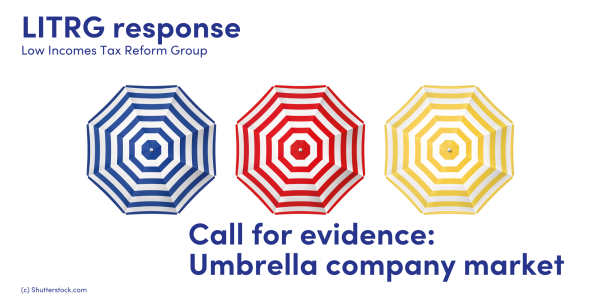Call for evidence: Umbrella company market
LITRG has responded to the call for evidence here.

The best way we can contribute to this call for evidence is to provide an update on the developments in the umbrella company marketplace we are aware of (since the publication of our ‘umbrella’ report in 2021). These fall into four broad categories, with ‘disguised remuneration’ (DR), notably, running as a theme throughout:
- Recent issues (as reported in trade press and mainstream media), including holiday pay abuses, cloning and cyber-attacks on umbrella companies. We offer some brief commentary and extra observations, for example, around the recent press stories on DR, where it seems to us that headlines such as ‘Medical staff are prolific tax avoiders’ and ‘It’s not just the rich that avoid tax: it’s teachers and nurses too’ are an unfair oversimplification.
- LITRG/TaxAid queries – since we wrote our report, we and TaxAid have continued to receive contact from taxpayers who are having problems with umbrella companies (particularly DR related). We include a selection in this response.
- HMRC’s own data – statistics released in November 2021 show that despite the ‘loan charge’, DR arrangements continue to proliferate. The data supports the case for decoupling the DR schemes from HMRC’s other efforts and presumptions in tackling tax avoidance, and for HMRC to explore alternative strategies.
- Other organisations’ reports and data – for example, the Loan Charge All Party Parliamentary Group (APPG) recently issued a report on their inquiry into ‘How Contracting Should Work’, which exposes the issues of ‘commissions’ paid by umbrella companies to agencies to incentivise them to refer workers; and comments on the extent to which this may have driven the operation of DR schemes. Of note is the ongoing industry led work trying to tackle the problems that exist due to the operation of DR schemes.
It is clear that some action is needed.
We sincerely hope that this call for evidence helps determine the shape of a future ‘single enforcement body’ regime of regulation but crucially, also prompts HMRC to flex their muscles to deal with DR appropriately and robustly. In our view, and as required by the PAYE regulations, HMRC should pursue umbrella employers in the first instance for any DR underpayment. HMRC failing to take action against umbrella companies and chasing workers for unpaid PAYE (against their own regulations), means there is no real incentive for the employers to stop using these schemes to pay people and the cycle continues.
In pragmatic terms, one of the ways that HMRC could start to translate thoughts and ideas about how to tackle DR, into a tangible reality, is for HMRC to appoint someone senior to take overall responsibility for umbrella companies. Their remit should include developing an action plan to tackle non-compliant umbrella companies from a tax perspective. This should include the formation of some kind of trusted, expert stakeholder group (which could include the compliant umbrella companies) to help challenge and guide HMRC in this area and hold HMRC to account.
We hope the updates, when taken together with our recommendations, will be useful input to the call for evidence team.
